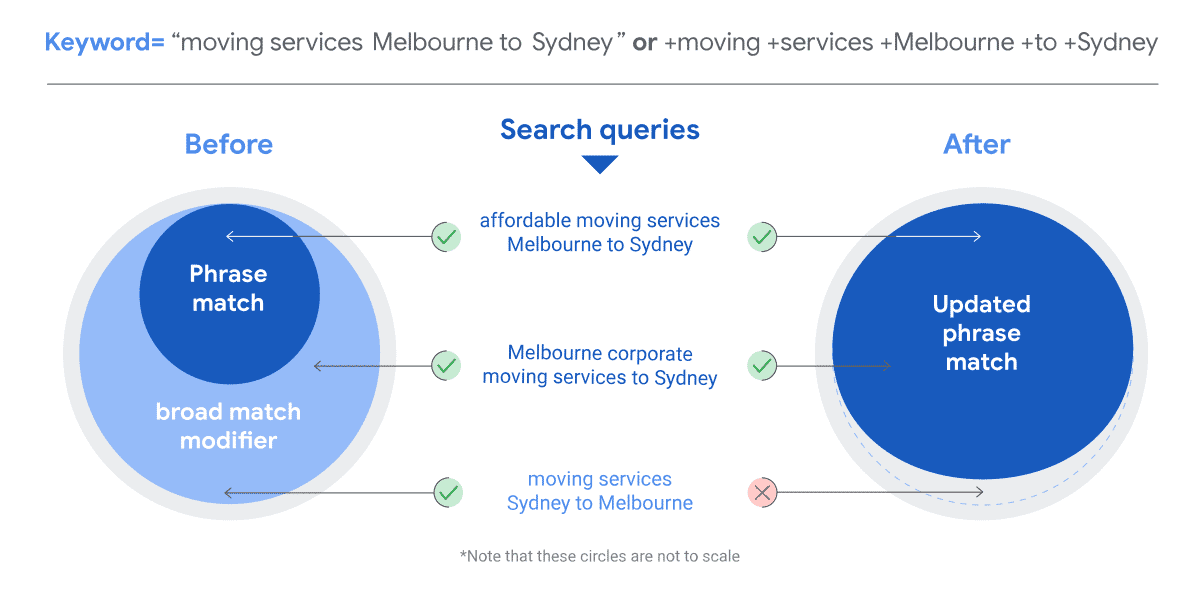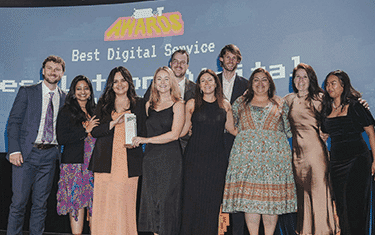A quick overview on what the latest Google update is all about, how it impacts advertisers, and what they should do to about it.
Overview
Last month, Google announced changes to the way keyword match types would behave moving forward, with the widely used Broad Match Modifier (BMM) to be sunsetted in July 2021. Since Feb 18th, Phrase matching capabilities have been expanded to encompass the previous BMM remit, effectively merging legacy BMM keywords into the new phrase match.
The Broad match product itself has been a focus of Google's development, with recent iterations incorporating additional signals, such as landing pages and implied sentiment, into the auction dynamics.
Imminently following this news was the announcement that Responsive Search Ads, the format which uses machine learning to optimise ad copy to be the most relevant user experience, will be the default ad type. Whilst Expanded Text Ads (ETAs) will be still available, RSAs will be the recommended setting moving forward, indicating that they can expect a similar fate as the "Standard Ads' in coming months/years.
Keyword evolution
These changes are the latest in a long line of Google's products to lean on machine learning capabilities to become more predictable in the bid to reach users across their inventory, and have been a work in progress for years.
Increasing mobile device usage created the need to match user expectations around speed and relevancy of information, with consumers operating in a state of "need to have it now". Google's own 'micro moment' methodology provides the framework for much of the tech development.

It is clear to see from a timeline of key events how this has rapidly increased over the past decade:
- 2012 - Phrase & Exact match included syntactic variants (misspellings, plurals, acronyms).
- 2017 - Exact match allows words within the keyword target to be re-ordered as well as the addition/removal of certain words that do not impact the meaning of the search query.
- 2018 - Exact match begins including synonyms, implied words, and words of the same meaning.
- 2019 - BMM & Phrase match incorporate synonyms, implied words, and variants with same meaning (as long as the user search has the same concept as the keyword target).
- 2021 - BMM is merged into Phrase match, forming a new-age Phrase match type which incorporates the broader style matching as standard
So, this leaves advertisers with the new age of matching;
- Exact – matches searches to the same meaning
- Phrase – matches searches that include the meaning of your keyword
- Broad – matches searches relevant to the keyword
Resolution Digital's PoV
Best practice requirements
As technology continues to evolve, so does best practice. Increasing automation and more predictive targeting methods mean that more complex, thorough keyword mapping is no longer beneficial.
The latest guidance is centred around consolidating campaigns according to the objective whilst keeping themes streamlined to ensure creative relevance.
Google's advice is to focus keywords on broader match types, enabling smart bidding to align with their goal. The bidding mechanism is controlled at query level rather than keyword when smart bidding is used, and so the rationale here is there will be a minimal incremental gain to repeating keywords in different match types, and the ease of management will be improved.
Campaign types like Dynamic Search Ads are set out to help advertisers increase their coverage based on their website content without having to do the hard work and build out individual groupings.
Impact for advertisers
The changes aim to increase relevancy and maximise coverage potential for advertisers, and when used in conjunction with smart bidding methods, in the right way, they can provide great results. However, there are some considerations for advertisers.
Advertiser Control
Increased reliance on automated solutions reduces the manual control advertisers have over their targeting, optimisation, and messaging display. As a result, brands with regimented requirements over their brand image and messaging may find some discrepancies.
Instances of this have occurred within formats such as Smart Display and Smart Shopping, prompting further product development to re-gain advertiser control of the way the ads are displayed, and similarly the ability to 'pin' headlines within Responsive Search ads.
Control over queries
Google has said that whilst Phrase match coverage will expand to broader coverage, it will continue to retain the words' ordering within the keyword target, though only when deemed relevant. This means that the machine will still be responsible for determining what is/is not relevant, and therefore removing much of the previous control advertisers had over their targets.
The methodology will not impact negative keywords, so this remains a key tool that advertisers can use to optimise and ensure brand safety measures
Volume constraints
Large scale campaigns with high volumes of conversion points are likely to benefit most from the consolidated structure and incremental boost they can capture from smart bidding AI, as well as the additional resource hours they can gain back. Smaller campaigns, however, may struggle to meet conversion thresholds for smart bidding efficacy, in which case they may need to broaden keyword matching unnecessarily or opt to shift optimisation goals away from their priority choice. Doing so poses a potential performance risk, either by lack of scale as a result of not shifting focus or efficiency by pivoting goal type.
Coverage Opportunities
The expanded remit, the onus on the use of broader match types, and AI-led creative solutions will help improve advertiser reach whilst reducing the need for manual keyword mining and segmentation. However, it may reach audiences outside the target as a byproduct.
In conclusion: What should advertisers do?
As the search landscape continues to immerse into a world of machine learning and we bid farewell to the widely used broad match modifier (BMM) match type, more and more of the features advertisers previously had control over, such as bid optimisation, ad/extension copy, and ad rotation are all predominantly automated.
While these changes aim to increase relevancy and maximise coverage potential for advertisers, and when used in conjunction with smart bidding methods, in the right way, can provide great results, however they do impact advertisers.
To prepare for this roll out, advertisers should;
- Increase vigilance on search queries and add relevant negative terms
- Apply audience overlays as 'observation' to guide help optimisations
- Structure campaigns and align smart bidding to the pillar objective
- Smaller advertisers/campaigns struggling with campaign optimisation due to their volume of signals should look to bundle groups together with the use of 'portfolio bid strategies.'
- Make use of dynamic features such as dynamic keyword insertion and ad customisers to make sure the copy is as relevant as possible to each user
- Adopt data-driven (or other non-last clicks) attribution method to maximise signals for the algorithm to use in optimisation
Have questions? Our paid search experts are here to assist you with your business challenge. Contact us today.
Ref links: Google Ads Support



